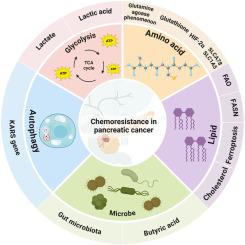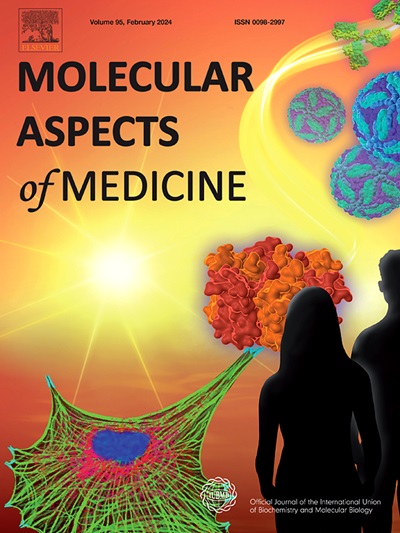胰腺癌耐药的代谢重编程:机制和影响
IF 10.3
2区 医学
Q1 BIOCHEMISTRY & MOLECULAR BIOLOGY
引用次数: 0
摘要
胰腺癌是一种高度侵袭性的胃肠道恶性肿瘤,由于其众所周知的高死亡率,常被称为“癌症之王”。其临床特点,包括诊断晚,手术可切除性低,复发率高,化疗耐药明显,预后差,共同推动发病率和死亡率持续上升。尽管治疗策略不断进步,但胰腺癌的管理,特别是在晚期,仍然具有挑战性。化疗仍然是目前治疗的主要方法。然而,普遍存在的化疗耐药问题对有效治疗构成了重大障碍。代谢重编程以葡萄糖代谢、脂质生物合成和氨基酸利用的改变为特征,支持癌细胞的高能量需求和快速增殖。新的证据表明,这些代谢变化,可能是由表观遗传机制介导的,也有助于肿瘤的发生和转移。这些发现强调了代谢改变在胰腺癌发病机制中的关键作用。本文综述了代谢重编程与化疗耐药之间的关系,讨论了其潜在机制,并总结了针对代谢的临床前研究和药物开发。目的是为胰腺癌的潜在治疗策略提供一个全面的视角。本文章由计算机程序翻译,如有差异,请以英文原文为准。

Metabolic reprogramming of drug resistance in pancreatic cancer: mechanisms and effects
Pancreatic cancer is a highly aggressive gastrointestinal malignancy, often termed the “king of cancers” due to its notoriously high mortality rate. Its clinical characteristics, including late diagnosis, low surgical resectability, high recurrence rates, significant chemoresistance, and poor prognosis have collectively driven the persistent rise in incidence and mortality. Despite ongoing advancements in therapeutic strategies, the management of pancreatic cancer, particularly at advanced stages, remains challenging. Chemotherapy remains the mainstay of current treatment. However, the prevalent problem of chemotherapy resistance poses a significant obstacle to effective treatment. Metabolic reprogramming, characterized by alterations in glucose metabolism, lipid biosynthesis, and amino acid utilization, supports the high energy demands and rapid proliferation of cancer cells. Emerging evidence suggests that these metabolic changes, possibly mediated by epigenetic mechanisms, also contribute to tumorigenesis and metastasis. These findings highlight the critical role of metabolic alterations in pancreatic cancer pathogenesis. This review explores the relationship between metabolic reprogramming and chemotherapy resistance, discussing underlying mechanisms and summarizing preclinical studies and drug development targeting metabolism. The aim is to provide a comprehensive perspective on potential therapeutic strategies for pancreatic cancer.
求助全文
通过发布文献求助,成功后即可免费获取论文全文。
去求助
来源期刊

Molecular Aspects of Medicine
医学-生化与分子生物学
CiteScore
18.20
自引率
0.00%
发文量
85
审稿时长
55 days
期刊介绍:
Molecular Aspects of Medicine is a review journal that serves as an official publication of the International Union of Biochemistry and Molecular Biology. It caters to physicians and biomedical scientists and aims to bridge the gap between these two fields. The journal encourages practicing clinical scientists to contribute by providing extended reviews on the molecular aspects of a specific medical field. These articles are written in a way that appeals to both doctors who may struggle with basic science and basic scientists who may have limited awareness of clinical practice issues. The journal covers a wide range of medical topics to showcase the molecular insights gained from basic science and highlight the challenging problems that medicine presents to the scientific community.
 求助内容:
求助内容: 应助结果提醒方式:
应助结果提醒方式:


